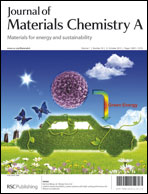Effect of precursor particle size distribution on the morphology and low wetting behavior of photocatalytic nanocoatings on glass surfaces
Abstract
The effect of particle size distribution of coating precursor on the morphology and low wetting character of photocatalytic nanocoatings is investigated in the present work. TiO2–SiO2–Al2O3 nanocomposite coatings containing Al2O3 particles of size in the range 20–200 nm have been prepared on glass substrates by an aqueous sol–gel process. A composite sol of titanium dioxide containing 30 mol% silica comprises the matrix sol to which alumina particles (1–10 mol%) having sizes in the range 20 to 200 nm are introduced as stabilized dispersions and further coated on glass substrates by the dip-coating method followed by annealing of the coatings at 400 °C. A composite coating containing 2 mol% boehmite derived alumina (TS-B-2) has been found to be more photoactive under visible light and was low wetting in nature. The higher photocatalytic activity of the TS-B-2 nanocomposite is attributed to the presence of phase pure anatase with crystallite size of 3.7 nm and high surface area of 315 m2 g−1, while the low wetting character is attributed to the hierarchical morphology resulting in uniform surface roughness. The present study significantly highlights the possibility of designing composite precursors containing desired constituent particle sizes to produce nanocoatings differing in grain sizes, surface roughness and morphology, resulting in increased self-cleaning and low wetting properties.


 Please wait while we load your content...
Please wait while we load your content...